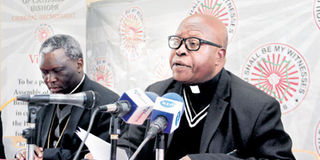Clerics blame North Rift killings on fight for oil and minerals

Archbishop Zacchaeus Okoth of Kisumu addresses a press conference in Nairobi on May 9, 2015. With him is Kenya Conference of Catholic Bishops Chairman Philip Anyolo. PHOTO | DIANA NGILA | NATION MEDIA GROUP
What you need to know:
- The Kenya Conference of Catholic Bishops warned that the cycle of death, especially in northern Kenya, would become the norm unless the government addresses the marginalisation in the region.
- Lodwar Bishop Dominic Kimengich concurred with the Rev Anyolo, saying there was a border dispute between the Turkana and the people in West Pokot over oil reservoirs.
- The clerics said 60 per cent of the people in Turkana are nomads and only 30 per cent of children go to school, a reflection of the marginalisation in the area.
Catholic bishops said on Friday the massacre in North Rift was not a result of cattle rustling but its due to the discovery of oil and minerals in the region.
The Kenya Conference of Catholic Bishops warned that the cycle of death, especially in northern Kenya, would become the norm unless the government addresses the marginalisation in the region.
More than 20 bishops from across the country called on the police to step up in providing security to Kenyans.
“The life of a person in Turkana is as valuable as that of someone in Nairobi. We have constantly warned that the conflict in North Rift is worsening, especially because of the minerals and oil.
“Lives are being lost in these wars, erroneously called cattle rustling,” said the chairman, the Rev Philip Anyolo, from Homa Bay.
The church leaders’ concerns come after more than 70 people were killed in Nadome on Monday by about 400 attackers, who made away with over 1,000 cattle and 5,000 goats. Nadome Village is on the border of Turkana and Baringo counties.
Lodwar Bishop Dominic Kimengich concurred with the Rev Anyolo, saying there was a border dispute between the Turkana and the people in West Pokot over oil reservoirs.
According to Bishop Kimengich, the oil is in Turkana but some Pokots want the boundaries shifted so that the oil falls within their area.
He said the residents were severely marginalised.
The clerics said 60 per cent of the people in Turkana are nomads and only 30 per cent of children go to school, a reflection of the marginalisation in the area.
The bishops said the fight for resources can only end if the government launches development projects in the area and starts meaningful dialogue. Bishop Cornelius arap Korir of Eldoret said; “Some leaders in the region talk a lot. They make promises but don’t come up with ways of preventing the conflict. They come back after killings,” he said.
The clerics agreed that disarmament was a sure way of averting the perennial fights.
They said local leaders and other people who continue arming and inciting the people against each other must be dealt with.





